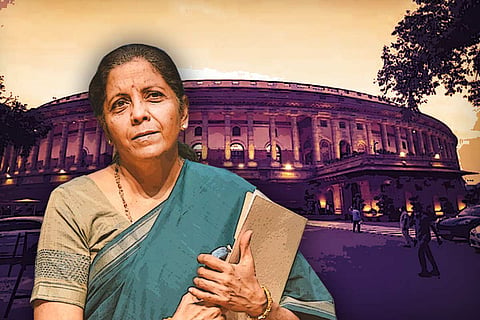

Presenting the Union Budget 2022, Finance Minister Nirmala Sitharaman on Tuesday, February 1, proposed enhancing the funding under the Performance Linked Incentive (PLI) scheme for domestic solar cells and module manufacturing to Rs 24,000 crore from the existing Rs 4,500 crore to make India an exporting nation. "For facilitating domestic manufacturing for the ambitious goal of 280 GW (GigaWatt) of installed solar capacity by 2030, an additional allocation of Rs 19,500 crore for PLI scheme for manufacturing of high efficiency (solar) modules with priority of fully integrate manufacturing units for polysilicon to solar PV modules will be made," she said in her Budget speech in the Lok Sabha.
In April 2021, the Union Cabinet approved a Rs 4,500 crore PLI scheme to boost domestic manufacturing capacity of solar PV (photo-voltaic) modules. The scheme was aimed at adding 10,000 MW (MegaWatt) manufacturing capacity of integrated solar PV modules entailing direct investment of Rs 17,200 crore at present (existing). With the increase in allocation to Rs 24,000 crore, the quantum of investments and domestic manufacturing capacity envisaged under the PLI scheme would further increase. The PLI scheme — National Programme on High Efficiency Solar PV Modules — approved by the Union Cabinet, was aimed at reducing import dependence in a strategic sector like electricity.
Under the scheme, solar PV manufacturers will be selected through a transparent competitive bidding process. The PLI will be disbursed for five years post commissioning of solar PV manufacturing plants, on sales of high efficiency solar PV modules. Manufacturers will be rewarded for higher efficiencies of solar PV modules and also for sourcing their material from the domestic market. The PLI amount increases with increased module efficiency and increased local value addition.
In November 2021, Power and New & Renewable Energy Minister R K Singh had told PTI,"We brought the PLI scheme (for solar cells and modules) worth Rs 4,500 crore. We invited bids and we got 54,500 MW manufacturing capacity of solar equipment. We asked the government to sanction Rs 19,000 crore more under the PLI, which was approved (in-principle). Now we would have a PLI of Rs 24,000 crore. We would be exporting solar equipment."
In her Budget speech on Tuesday, the Finance Minister stated that the risks of climate change are the strongest negative externalities that affect India and other countries. She repeated the Prime Minister's quote during the COP26 summit in Glasgow last November, where he had said, “What is needed today is mindful and deliberated utilisation instead of mindless destructive consumption."
"The low carbon development strategy as enunciated in the panchamrit' that he (PM) announced is an important reflection of our government's strong commitment towards sustainable development," Nirmala Sitharaman said on Tuesday.
This strategy opens up huge employment opportunities and will take the country on a sustainable development path. This budget proposes several near term and long term actions accordingly, she added.
She also said that the data centre and energy storage system will be given infrastructure status to provide easy financing to the sector. Sitharaman informed that the private equity and venture capital investors invested Rs 5.5 lakh crore in startups. She further said an expert committee will be set up to suggest measures to help attract more investments. Measures will also be taken to step up private capital in the infrastructure sector, she said.